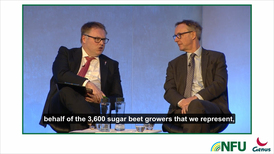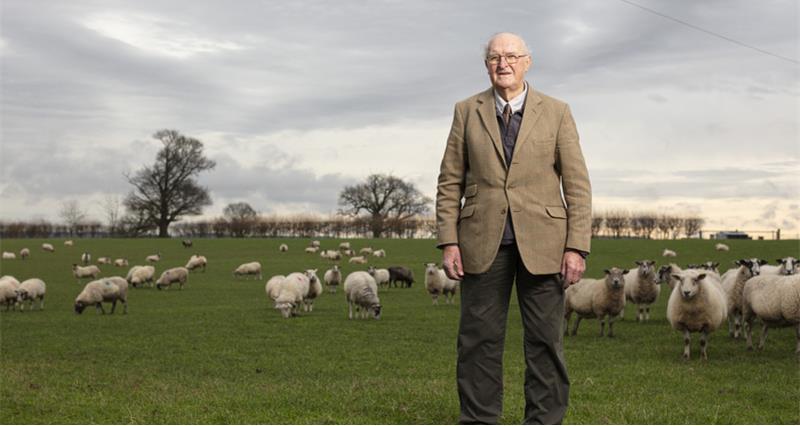“Things are looking pretty tough,” Mr Johnson began his presentation which charted a deteriorating economic outlook for the next five years.
“I would describe this government as Augustinian, as in Augustine of Hippo: ‘Lord make me virtuous but not yet’ – this is how I would describe quite a lot of the government’s economic policies,” he added – a description which would become a common theme throughout his presentation.
Looking ahead to the Spring Forecast, due at the end of March, Mr Johnson warned the Chancellor had left herself “no space at all against her iron clad fiscal rules, meaning she will be almost certainly breaking those rules”.
This would mean something would need to be done on tax or spending, Mr Johnson said.
“One problem is the don’t have an underlying theory for growth – no sort of theory of public service reform as there was under the Blair government. For example, they say – let’s deregulate while imposing new regulations, let’s focus on growth while using least growth friendly way of increasing taxes.”
Growth abysmal since 2008
“At least in the rhetoric, the government is right to focus on growth,” Mr Johnson said, outlining data which showed that average earnings/medium earnings are the same now as they were in 2008. “We have not seen a nearly 20-year period like that since Napoleon was trying to invade – that is the scale of how extraordinary this period has been.”
“In the long-term they have the right set of ideas, in the short-term a whole series of measures which are going to damage growth in the short-run.”
Paul Johnson, Director of the Institute for Fiscal Studies
Mr Johnson acknowledged the government had made lots of positive announcements and “had the right idea on some things”, such as planning reform, and housebuilding targets, as well as the third runway planned for Heathrow, although he expressed doubt as to whether these would come to fruition.
“The political problem with all of this is first we don’t know if it will happen […] second if they do happen, the impact on growth will be well beyond the end of this parliament.”
Employers’ NI increase
“So what have they [the government] actually done?” Mr Johnson questioned. “This comes back to my Augustinian point. A whole load of things which are very clearly not good for growth.”
“My head hit the table when the Chancellor announced an increase in stamp duty on second properties,” Mr Johnson admitted. “This is the worst tax there is […] it is extraordinarily bad for growth.”
He said the government had chosen the “least growth-friendly” way of raising money by focusing on Employers’ NI contributions.
“This is clearly a breach of their manifesto commitment,” he said.
“In the long-term they have the right set of ideas, in the short-term a whole series of measures which are going to damage growth in the short-run.”
Defence spending knock-on effect
Mr Johnson said the Autumn Budget had been big “in the sense of lots of money”, but not in terms of tax reform. “It really was just a budget to increase tax and spending without changing anything very fundamental.”
He said for the first time in decades, the government is taking more tax from the public than what it is giving back, other than their spending on debt interest, to prevent debt rising further. “This is not a recipe for a happy electorate,” he noted.
Referring to the Prime Minister’s announcement earlier that day, that defence spending will rise to 2.5% of GDP by 2027, Mr Johnson said this was a “remarkable change politically” in terms of the aid budget which has been cut to 0.3%.
“Continued increases in defence are going to cause a real problem for other bits of public services,” he said.
“Health is the big beast here. We have spent far more than any other public service – when we look into the future it’s health, health, health that drives continued increases. Are those taxes going to come back down in my lifetime? I can’t see a world where that happens.
“One of the reasons Rachel Reeves has got a big problem is that she’s going to go to her cabinet colleagues when it comes to the June Spending Review, saying, at best, ‘you’re getting nothing’, and quite possibly telling them they’re going to get cuts.”
Mr Johnson predicted that spending plans would get even tighter, meaning either cuts to some government departments or tax rises would be needed.
“The Chancellor has got a very difficult set of choices to make at the end of March and the Spending Review in June.”
Paul Johnson, Director of the Institute for Fiscal Studies
The right words, but will they bring the right results?
Despite this, Mr Johnson said he was in many ways encouraged by announcements the government has made.
One of the best speeches he said he heard from the Prime Minister at the Labour Party Conference was when he made it clear there were choices that had to be made to get the growth needed.
“We’ve got all the right words about the long-term […] even when they result in negative immediate publicity. But more concerning is that the immediate changes we're seeing don't look to me to be terribly consistent with that.
“The Chancellor has got a very difficult set of choices to make at the end of March and the Spending Review in June.”
The Henry Plumb Lecture is held every year and brings together key players from the agriculture sector, to speak on and debate the latest thoughts on farming, and where the industry is headed in the future.
Meet the speakers from this session
Paul Johnson
Director of the Institute for Fiscal Studies
As well as analyses of the economy and future of government spending, Paul also considers the economics of climate change and the path to net zero, the effects of inequality, and the long and short-term impacts of shocks including Brexit and Covid-19.
Paul has published and broadcast extensively on various issues in the economics of public policy including tax, welfare, inequality and poverty, pensions, education, climate change and public finances. He is the author of major books on pensions, tax and inequality and is a regular contributor to news and current affairs programmes across the UK broadcast media.
As well as a previous spell at the IFS in the 1990s (including a period as deputy director) Paul has been chief economist at the Department for Education and director of public spending in HM Treasury. At the Treasury his responsibilities included public sector pay and pensions and climate change policy. In the latter role he worked closely with Nicholas Stern on his review of the economics of climate change. Other positions include a period as head of economics at the Financial Service Authority and as a senior associate with Frontier Economics.
Paul was also deputy head of the Government Economic Service. He served on the council of the Economic and Social Research Council and was elected to the council of the Royal Economic Society. He was a founder council member of the Pensions Policy Institute and has led a review into the policy of pensions auto-enrolment. Other roles and bodies Paul has been involved in include the council of the Family and Parenting Institute, the Pension Provision Group, the Commission on taxation and citizenship, the Youth Justice Commission and the Commission on Living Standards.
Terry Jones
NFU Director General
Leaving FDF at the end of 2014, he took up the post of DG at the Provision Trade Federation (PTF) looking after the interests of businesses involved in the UK bacon and dairy trade.
Before working at FDF and PTF Terry worked for the NFU from 2002-2011 in a variety of roles including Head of Government Affairs, Head of Food Chain and Director of Communications.
Terry lives in Cheshire with his wife Emma and their two daughters.







